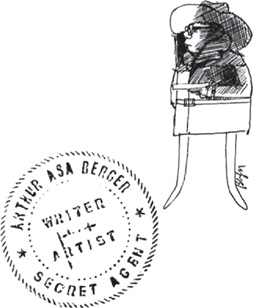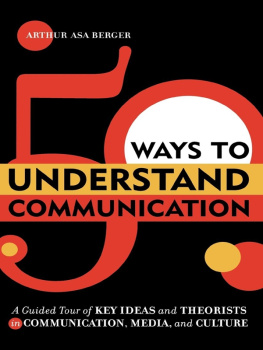Arthur Asa Berger - Messages: An Introduction to Communication
Here you can read online Arthur Asa Berger - Messages: An Introduction to Communication full text of the book (entire story) in english for free. Download pdf and epub, get meaning, cover and reviews about this ebook. year: 2016, publisher: Routledge, genre: Home and family. Description of the work, (preface) as well as reviews are available. Best literature library LitArk.com created for fans of good reading and offers a wide selection of genres:
Romance novel
Science fiction
Adventure
Detective
Science
History
Home and family
Prose
Art
Politics
Computer
Non-fiction
Religion
Business
Children
Humor
Choose a favorite category and find really read worthwhile books. Enjoy immersion in the world of imagination, feel the emotions of the characters or learn something new for yourself, make an fascinating discovery.
- Book:Messages: An Introduction to Communication
- Author:
- Publisher:Routledge
- Genre:
- Year:2016
- Rating:5 / 5
- Favourites:Add to favourites
- Your mark:
- 100
- 1
- 2
- 3
- 4
- 5
Messages: An Introduction to Communication: summary, description and annotation
We offer to read an annotation, description, summary or preface (depends on what the author of the book "Messages: An Introduction to Communication" wrote himself). If you haven't found the necessary information about the book — write in the comments, we will try to find it.
Messages: An Introduction to Communication — read online for free the complete book (whole text) full work
Below is the text of the book, divided by pages. System saving the place of the last page read, allows you to conveniently read the book "Messages: An Introduction to Communication" online for free, without having to search again every time where you left off. Put a bookmark, and you can go to the page where you finished reading at any time.
Font size:
Interval:
Bookmark:

In memory of Floyd Horowitz
MESSAGES
An Introduction to Communication
Arthur Asa Berger


2 Park Square, Milton Park, Abingdon, Oxon OX14 4RN
711 Third Avenue, New York, NY 10017, USA
Product or corporate names may be trademarks or registered trademarks, and are used only for identification and explanation without intent to infringe.
Changing the Way You See the World, One Page at a Time

I would like to thank Mitch Allen for suggesting I write this book, for his suggestions about how the book might be organized, and his comments, all through the drafts, about enhancements to the discussions that might be considered. I also want to thank all the communication scholars and theorists whose work I have used in the book. I also owe a debt of gratitude to my production editor Ryan Harris, copy editor Michael Jennings, my book designer Hannah Jennings, and everyone else involved in the production of this book. It takes a number of people to produce a book, and I appreciate the efforts of everyone who worked on it. Ive used a number of my own drawings and other images to make the book more visually interesting and have drawn upon my previous writings in updated versions at various places in this book.

Changing the Way You See the World, One Page at a Time

Rhetoric does certain things; it has certain functions. In its broadest sense, rhetoric refers to the ways in which signs influence people; and through that influence, rhetoric makes things happen. When people speak, when they make television advertisements, when they write essays, they are attempting to carry out some function. What that function specifically is, whether it is good or bad, will vary with ones definition. The Sophists would say that the function of rhetoric is to persuade others while participating in a democratic society, while Plato would say that the function of rhetoric is to flatter or mislead people.
Barry Brummett, Rhetoric in Popular Culture, 3rd Edition
At this moment he wished to be a man without qualities. But this is probably not so different from what other people some-times feel too. After all, by the time they have reached the middle of their lifes journey few people remember how they have managed to arrive at themselves, at their amusements, their point of view, their wife, character, occupation and successes, but they cannot help feeling that not much is likely to change any more. It might even be asserted that they have been cheated, for one can nowhere discover any sufficient reason for everythings having come about as it has. It might just as well have turned out differently. The events of peoples lives have, after all, only to the least degree originated in them, having generally depended on all sorts of circumstances such as the moods, the life or death of quite different people, and have, as it were, only at the given point of time come hurrying towards them. Something has had its way with them like a flypaper with a fly; it has caught them fast, here catching a little hair, there hampering their movements, and has gradually enveloped them, until they lie, buried under a thick coating that has only the remotest resemblance to their original shape.
Robert Musil, The Man Without Qualities
Like all authors, Id like to think that this book will change the way you think about its subjectin this case, communication. And I hope it will also change the way you see the world and maybe even change, to some degree, how you think about yourself.
Inside every fat book there is a thin book struggling to escape. This book is a thin book that has escaped from being a fat book by focusing upon what I believe to be the key concepts or most important elements in the communication process, such as words, conversation, rhetoric, codes, language, methods of analysis, textual criticism, and visual communication.
A number of years ago an editor asked me to write an introduction to communication. Write one for me and youll be able to take your wife to Europe every summer, he said. As we spoke, the image of a big, fat book formed in my mind, and I declined his offer. You have to understand that it is very difficult for a writer to decline an offer to publish a book by an editor, because the idea of being able to take ones wife to Europe every summer is powerful. I declined because I realized that I wasnt the kind of person to write one of those gigantic introductions to communication, as most editors envision such books.
I used a football metaphor to explain why I didnt want to write the book. You want a fullback kind of writer, I said, a big, strong bruiser of a writer who can easily crank out a thousand or fifteen hundred pages of manuscript. I am more like a wide receiver, and like all wide receivers, I am guided by my own passions. I write short books on topics that interest me. That was twenty years ago.
So, when Mitch Allen and I were having a nice dim sum lunch at the House of Banquet Restaurant on Clement Street in San Francisco and he suggested I write an introduction to communication, I accepted his offer because I realized that he would let me write a different kind of introduction to communication than the usual ones. And because having been rejected so many times by Allen, who I call The Great Rejecter, the idea of not accepting his request that I write a book didnt enter my mind. He also wanted a book of about 50,000 wordsa relatively moderate sized book as introductions to communication books go.

I decided to focus upon messages and the various ways in which we generate messages and others interpret them. I argue that we are always sending messages, even though we may not be conscious of doing so; we are always receiving messages from others who may not realize they are sending them, and we all try to control the messages we send to others and interpret the messages we receive from them to the best of our ability.
Font size:
Interval:
Bookmark:
Similar books «Messages: An Introduction to Communication»
Look at similar books to Messages: An Introduction to Communication. We have selected literature similar in name and meaning in the hope of providing readers with more options to find new, interesting, not yet read works.
Discussion, reviews of the book Messages: An Introduction to Communication and just readers' own opinions. Leave your comments, write what you think about the work, its meaning or the main characters. Specify what exactly you liked and what you didn't like, and why you think so.








